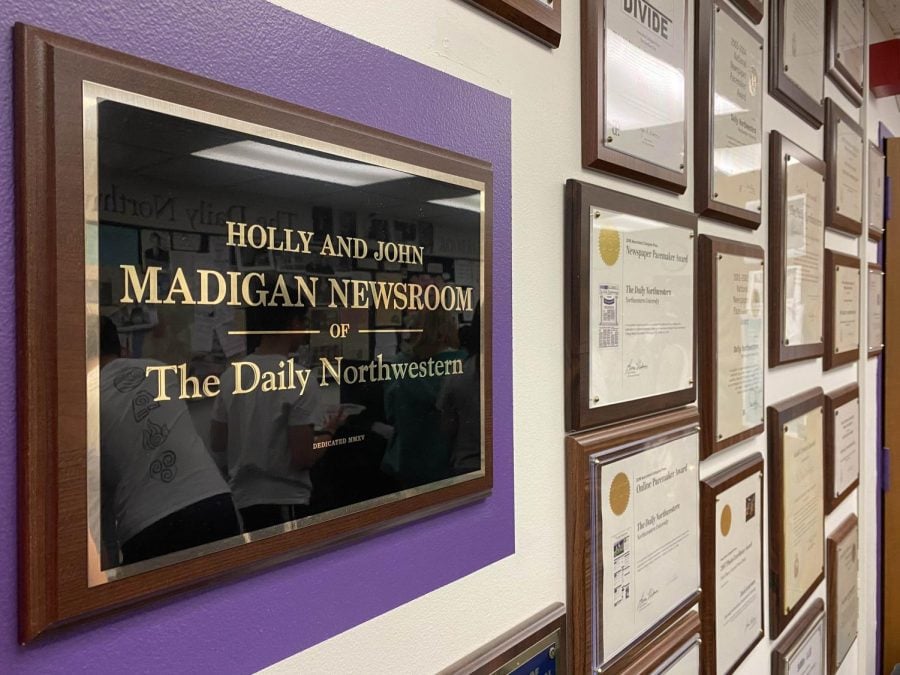The Daily Northwestern’s archives reveal cultural shifts and controversies
Samantha Powers/The Daily Northwestern
The Holly and John Madigan Newsroom. The World War I draft impacted female staffing on the paper’s editorial board.
May 30, 2023
A quick search of the keyword “Dillo” in The Daily Northwestern’s archives reveals a rich history of the student-run festival. The first-ever Dillo Day, known then as “‘I Don’t Think We’re In Kansas Anymore’ Festival and Fair,” was celebrated back in 1973.
The Daily’s archives contain that fact and many more. The collection is “arguably the single-strongest source of information” about the University’s history, according to NU archivist Kevin Leonard.
“For a long time, the University wasn’t in the business of collecting its historical records in a comprehensive fashion. So for the 19th and early 20th century, (the archive) is not only a great source of information, but sometimes it’s the only available source of information,” Leonard said.
Archived issues of The Daily are digitized. Students, faculty, staff and alumni can access these issues, dating back to 1871, via NU’s Library Search. The archives are text-searchable; all it takes is a keyword to find every available mention of a chosen term.
History Prof. Lauren Stokes said a simple search can lead to discoveries about the University during a certain time period.
“Sometimes, if you do the full-text search thing, you just kind of plunge in and don’t get a full sense of, ‘What was the culture of The Daily like in this period?’” Stokes said. “I like to look for a topic in The Daily and then read around it a little bit.”
During the 1918 influenza epidemic, for example, one could find articles about outbreaks, reactions and quarantines next to articles about poetry, original cartoons and tobacco advertisements.
Beyond small details, perusing the Daily’s archive can uncover broad cultural shifts in NU’s history, she said.
When Stokes wanted to research student responses to the 1918 influenza epidemic, she uncovered a deeper story of gender dynamics, edit board controversies and World War I.
During the war, men at NU were subject to the Selective Service Act of 1917. The draft left room for more women to edit male-dominated campus publications, such as The Daily, Stokes said.
“The men come back from the war, and there’s a clash,” Stokes said. “The men are like, ‘We’re back from the war, we want The Daily back,’ and the women are like, ‘We can do it, too.’”
The Daily’s editorial board in May 1917 was all men, except for the women’s editor and assistant women’s editor positions. By January 1919, a majority of the board members were women. But by late 1920, the board had returned to its male-dominated status, and the designated “Women’s Editor” position was back.
Stokes said she would not have seen this distinction without reading around her initial search about the influenza epidemic at the University.
“I wasn’t realizing I’d go into 1918 and find this story about breaking down the gender barriers at The Daily Northwestern, but I did,” Stokes said.
These editorial controversies are just one example of the larger storylines that can be found in The Daily’s archives.
Interested students and researchers, such as Bienen and Weinberg freshman Lily Walters, have used the archives to investigate personal curiosities and learn about NU’s history.
“The more you uncover, the more you learn about these people whose lives came before you,” Walters said.
Walters began looking through the archives after developing an interest in Asbury Hall. Walters often walked by 1830 Sherman Ave, where the hall once was, and found that the building stood out to her. After speaking with the University archivist and going through the archives herself, Walters found that the 1830 building, once known as Asbury Hall, was a center for progressive activism on campus, primarily by students of color, in response to racial segregation in the 1950s and ’60s.
Walters said she found the process of investigating the paper’s archives deeply rewarding.
“It was so much fun. I had the best time,” Walters said. “It felt like I was making and discovering my own mystery as I went along.”
Email: [email protected]
Twitter: @lilliannnali
Related Stories:
— Evanston History Center preserves archives, accolades of the city’s past


